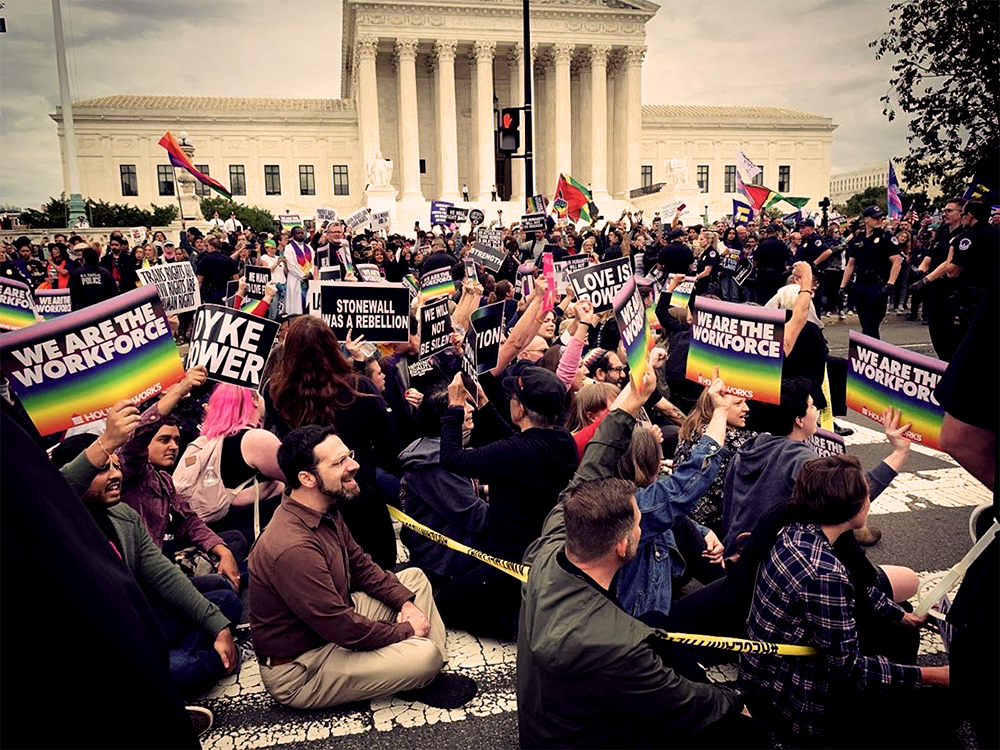Georgetown University students demonstrated in support of LGBTQ labor rights outside of the Supreme Court Oct. 8 as opening arguments on three high-profile cases were presented to the court.
The Supreme Court heard two cases on whether LGBTQ rights are protected under Title VII of the Civil Rights Act of 1964. One case, Bostock v. Clayton County, Georgia, involves a man who alleges he was fired from his job in Georgia after his employer learned he was gay. Altitude Express Inc. v. Zarda, a similar case in which a skydiving instructor at New York’s Altitude Express was fired for sharing that he was gay with a client, was combined with Bostock v. Clayton Country, Georgia at the Supreme Court.
The second case, R.G. & G.R. Harris Funeral Homes Inc. v. Equal Employment Opportunity Commission, centers around a Michigan woman who says she was fired from her job at a funeral home for publicly coming out as transgender. R.G. & G.R. Harris Funeral Homes Inc. v. Equal Employment Opportunity Commission is the first case regarding transgender rights to be heard by the Supreme Court.

Hundreds gathered in the demonstrations organized by the Human Rights Campaign, American Civil Liberties Union, National Center for Transgender Equality and National LGBTQ Task Force. Around 10 Georgetown students participated in the demonstrations, according to Isai Soto (COL ’23), a GUPride and Georgetown University’s Queer People of Color member who attended the protest.
Title VII of the Civil Rights Act of 1964 prohibits employment discrimination based on race, color, religion, sex and national origin. Lawyers representing President Donald Trump’s administration are pushing for the court to uphold lower courts’ decisions that the term “sex,” as defined in the parameters of employment discrimination in Title VII, does not apply to sexual orientation and gender identity, according to The Washington Post.
Participating in the protests outside the Supreme Court was essential to demonstrating support for the LGBTQ community, according to Soto.
“It was a really important thing to be there to show my support for my community as well as showing face for others there,” Soto said. “I don’t identify as a transgender person nor as a nonbinary person, but I understand the solidarity that comes with it.”
Over 100 protestors were arrested during the demonstrations for crowding, obstructing or incommoding, according to Newsweek. As a queer woman of color, these arrests are concerning because they imply voicing opinions on LGBTQ issues can put a person in danger, demonstrator Jade Ferguson (SFS ’22) said.
“It’s crazy thinking that standing up for what I believe in puts me in a place where I could possibly be in trouble and be in danger,” Ferguson said. “Especially as a queer woman of color where our judicial and law system are tainted in favor of white males.”
The current administration has refused to include the LGBTQ community under the coverage of Title VII, leaving the LGBTQ community fearful of job security and safety, GUPride co-president Al Castillo (SFS ’22) wrote in an email to The Hoya.
“Although LGBTQ+ Americans exist in every crossroad of life, we still live in fear of job termination, discrimination, and violence within the workplace,” Castillo wrote. “Excluding our queer, transgender, and non-binary workers from Title VII will validate the unjust treatment we endure instead of dismantling the homophobia and transphobia in companies and businesses.”
These cases are monumental for the transgender community and present an opportunity to stand up for their rights, Castillo wrote.
“For the transgender and non-binary community, it is the first time we are represented in the federal government, and we have the opportunity to speak up for our necessary liberties,” Castillo wrote in an email to The Hoya.
Alongside groups advocating for the rights of gay and transgender workers, the protests included many anti-LGBTQ rights counter protestors. In response to anti-LGBTQ rights advocates, Soto held a sign saying “Fellas, Is It Gay To Have a Job?”
Obstacles to any LGBTQ rights demonstrations, such as anti-LGBTQ slurs and sayings, strengthen the movement by bringing the LGBTQ community closer together, according to Ferguson.
“I think it brings us closer together because we all laugh at it together and we’ll make that a photo op; we all take the time to point it out,” Ferguson said. “Our community is strengthened even more in the face of opposition.”
Seeing other Georgetown student demonstrators outside the Supreme Court reflects the politically active campus environment of the university, according to Soto.
“I think there’s the Georgetown label of politically active students and I feel like we’re used to being upset with the administration or higher up,” Soto said. “Of course we’re going to rally behind this because we’ll rally behind other things on campus too.”




















